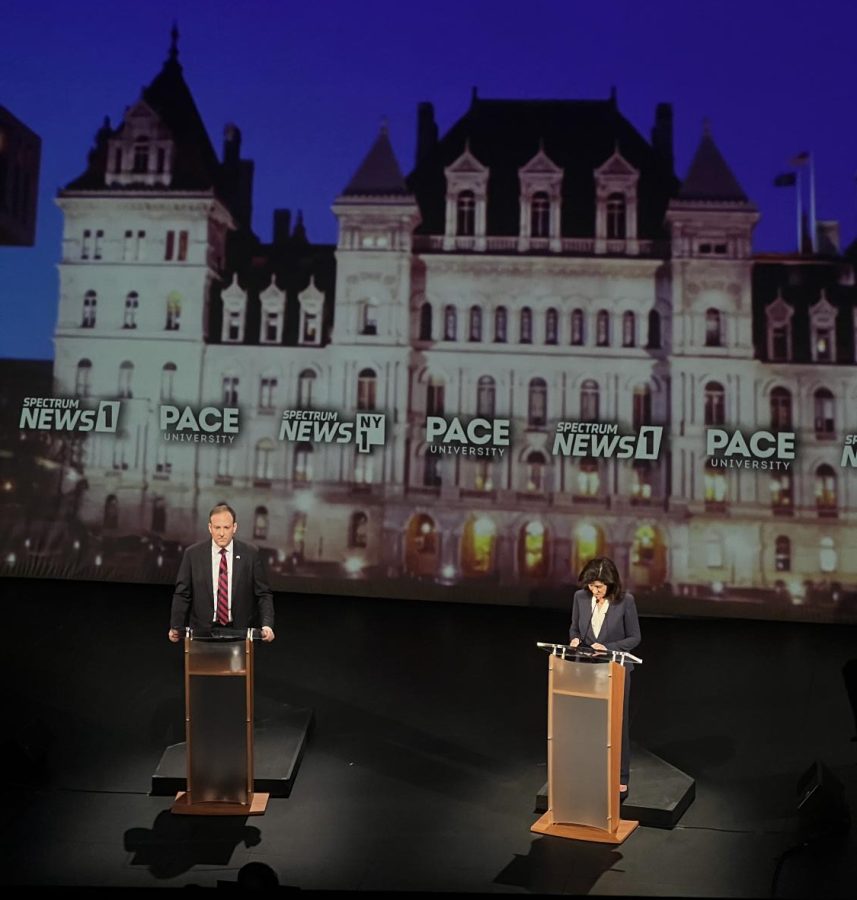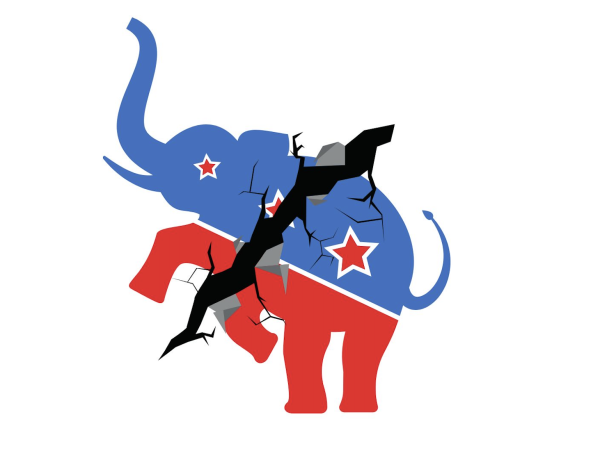University hosts historical 2022 NYS Gubernatorial Debate
Congressman Lee Zeldin (left) and Governor Kathy Hochul (right) prepare for their debate just minutes before the live broadcast on the Schimmel Theater stage. (Photo/Mandi Karpo)
October 26, 2022
The University hosted the only scheduled Gubernatorial Debate between Dem. Gov. Kathy Hochul and Rep. nominee, Congressman Lee Zeldin for the 2022 midterm elections for New York State Governor on Oct. 25. During the hour-long debate, each candidate had 60 seconds to respond to moderated questions while given the opportunity to respond if either was addressed by their opponent; a politically historical landmark for the University community.
Gov. Hochul is now running for her first full term after assuming office on Aug. 24, 2021, when former Gov. Andrew Cuomo resigned following claims of sexual and workplace harassment and undercounting the nursing home deaths during the pandemic. Congressman Zeldin seeks to be the first Republican Governor state-wide since 2002, having represented New York’s first congressional district in Congress since 2015.
Recorded live by Spectrum News 1 in the Schimmel Center and moderated by Errol Louis from NY1 News and Susan Arbetter for Spectrum News 1, crime and public safety took the hot seat as the first topic of discussion. Zeldin revisited the issue throughout the debate’s entirety as continued controversy swarmed Hochul in whether her administration is to blame for the rising crime rates in New York City and NYS.
Other topics that were addressed included economic inflation and abortion regulation, with a cross-examination and lightning round that touched upon the candidates’ opinions on several issues, like Zeldin’s anti-COVID vaccine mandate and approval of religious exemptions, Hochul reaffirming the legitimacy of her campaign practices after facing public scrutiny for making policy changes after receiving considerable donations from donors and a question curated by Pace Debates regarding the legalization of cannabis. The organization played an instrumental role in working with Spectrum News 1 and the University’s Public Affairs team to organize Tuesday’s debate.
“New York is in crisis… you’re poor and less safe because of Kathy Hochul and [her] extreme policies. This is your opportunity to save New York,” said Zeldin, who was the first candidate chosen to start the debate with opening statements after a televised random drawing Tuesday morning.
In her opening address, Hochul called out the congressman for being one of former President “Donald Trump’s strongest and most loyal supporters,” recalling his involvement in the Jan. 6 Capitol insurrection and his sending text messages in efforts “to orchestrate the big lie,” referencing the attempt to overturn the 2020 Presidential election results.
After opening remarks were made as a framework for what was to come, Zeldin responded first to Louis’ question on public safety, which addressed the congressman’s promise to invoke a State of Emergency on crime to suspend several laws on bail reform to improve public safety.
Zeldin remained steadfast in his response in wanting to repeal cashless bail, the No-Fault Act, Raise the Age legislation and the Less is More Act, despite going against the States Division of Criminal Justice Services statistical findings, which states it is too premature to draw conclusions about bail reform’s impact on incarceration.
As part of Zeldin’s “tough-on-crime” campaign, similar to that of Mayor Eric Adams’ campaign trail, he has vowed to remove Alvin Bragg, the 37th District Attorney for Manhattan on his first day in office if elected. Louis iterated that the State’s Constitution “specifies that removing a DA is not simple and is not automatic,” the removal for which “requires specific charges of wrongdoing.”
“So much of the systemic issues that we’re seeing in our criminal justice system are a result of not understanding the complexities behind it,” noted Taylor Mangus, the Vice President of Pace Debates. “It’s so easy to say ‘let’s be tough on crime.’ That’s what Mayor Adams said when he first came into office, and things didn’t change all that much. Bills have been changed, homeless people have been forcibly removed off the subways and streets, and yet, violent crime persists.”
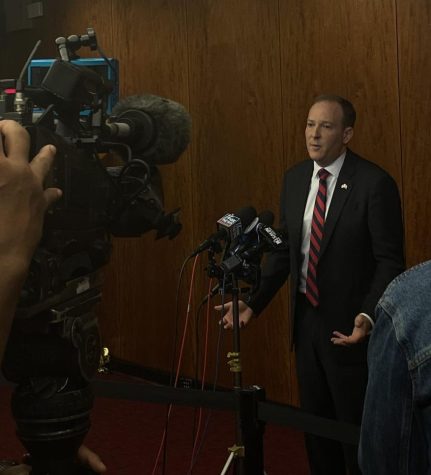
When asked about the alleged misconduct that Zeldin would claim as grounds to remove Bragg from office, the Republican nominee used Jose Alba as precedent. Alba, a bodega clerk, was sent to Rikers Island on murder charges in July 2022 for fatally stabbing Austin Simon in self-defense. Zeldin claimed that “Alvin Bragg is not doing his job” after the DA’s office dropped the charges and Alba announced he is moving back to the Dominican Republic “because he didn’t feel safe here.”
“It seemed like [Zeldin] used a lot of buzz words when it came to issues here in the city, as well as the state,” said Aman Islam, Student Government Association (SGA) Executive President. “Not really offering solutions, even saying things that are outside of his ability as Governor. For example, immediately firing a DA who is duly elected.”
To address the increase in crime and public safety concerns, with the overall crime rate in 2022 escalating to over 57 percent with eight homicides on MTA subways, Hochul and Mayor Adams announced a plan to increase police presence in the subways and install more security cameras.
Islam believes that “the Governor definitely had some pitfalls as well. She could’ve [been] a little bit tougher on him [for] certain things,” failing to “bring up racial injustice when it comes to crime and bail reform.”
“Republicans and Democrats miss a lot of nuances when it comes to crime, especially policing in the Metro,” said Ellis Clay, a sophomore member of Pace Debates. “These two candidates missed that point on the heavy-hitting questions of, if we’re putting more police in these subways, why hasn’t it been effective to this point? And why do we think more policing will be effective?”
Arbetter transitioned to the economy, noting that New Yorkers polled their top concern in the city being global record-breaking increased inflation rates. Zeldin claimed that he plans to implement a State spending cap, bring down tax rates, reverse the States ban on the safe extraction of natural gases and create more jobs to generate revenue in providing relief to NY families.
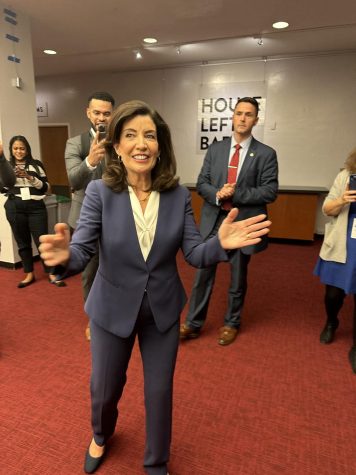
The Governor denounced Zeldin’s assertion for wanting to create more job opportunities, calling him a disingenuous congressman for voting against legislation that would do so, like President Biden’s Infrastructure Bill and Inflation Reduction Act. Hochul discussed her past initiatives that have provided relief to NY families like cutting taxes for middle-class families, providing individuals with property tax rebates and suspending the State tax on gasoline. If re-elected for a full term, Hochul plans to build a million more homes to “help drive down affordability issues for families.”
University students and NYC residents are familiar with the record-high surge in rent in the city, with a 34 percent increase since January 2022. Zeldin did not have a direct reply when Louis asked how he would ensure families could access stable and affordable housing. He stated that affordable housing should be available for families and companies who have the money to invest in the state while “creating more good paying jobs [is]… important for us to be able to have individuals who can afford to have that dream of home ownership.” The juxtaposition of Hochul’s rebuttal summarized the last budget her administration oversaw which allocated $25 billion to build 100,000 more affordable housing units.
“I think that was an overall hain tonight, from both parties, focusing more on what [they] wanted to say, and not the question,” Mangus commented.
Moving into more contentious waters, Arbetter changed the debate topic to abortion, clarifying Hochul’s support for pro-choice before asking if there were any restrictions around abortion that she would approve of.
In an indirect reply, the Governor pointed the finger at her opponent, stating that “We can talk about policies all you want, but let’s look at the record. There is very few people in Congress who have a more pro-life record, someone who has said he’d bring on a pro-life commissioner… Women need to know that that’s on the ballot this November as well.”
Polls show that New Yorkers support the right to have an abortion by a large majority, a right that Zeldin’s own campaign does not support in his non-commital to provide State funding to Planned Parenthood. He contended against a Republican legislator from changing the abortion laws and clarified he would not sign them into law, nor does he believe a Republican legislator will be in office in January.
Contradicting the polls, the congressman claimed to have had conversations with fellow pro-choice New Yorkers who say they do not want their tax dollars funding people’s abortions living “fifteen hundred miles away” from them. While this may be true, Zeldin held the importance of following the will of the people on multiple occasions throughout the debate, yet conveniently adjusted the public’s opinion to align with his own agenda.
The cross-examination started off with Zeldin accusing Gov. Hochul of partaking in “pay-to-play” corruption that is “plaguing” her administration, and asked her what mechanisms she plans to put in place to avoid these acts. Accepting the premise and on the defense, Hochul denied any participation in such corruption stating that “there has never been a quid pro quo, a policy change or decision made because of a contribution.”
Switching roles, Hochul asked the congressman point-blank, “Is Donald Trump a great President?” Rather than the yes or no response the Governor initially wanted, Zeldin took the full minute to explain the humanitarian research he and the former President collaborated on such as “work to secure the Southern border, …moving the Embassy in Israel from Tel Aviv to Jerusalem, getting the Abraham Accords pushed [and]… the effort to go after the Iran and nuclear deal,” among other listed examples.
“I will take that as a resounding yes, and the voters of New York do not agree with you,” Hochul said to conclude.
The lightning round where candidates were tasked to answer with a brief yes or no, began with the usual question prompting debate candidates to answer whether they want to see their political party’s affiliated President run for the 2024 election. Other questions that followed were specific to the candidates’ campaign promises or previous public statements.
Asking the candidates whether New York has “sufficient protections in place to protect the health of young people,” a question prompted by Pace Debates, Zeldin said “Absolutely not,” recounting a negative experience of having smelled cannabis getting on the 2 train coming to the University from his office. On the other hand, Hochul stated that she wants to properly tax cannabis and open a new branch of the economy spearheaded by marginalized groups who have been victims of mass incarceration due to the previous outlawing of cannabis in New York.
The lightning round also touched upon drug administrator centers in NYC and immense public funding for the new $600 million Buffalo Bills stadium, but the only subject the opponents could agree on was lifting the cap on charter schools. The debate ended with Hochul and Zeldin in complete disagreement over COVID-19 masks and vaccination mandates, with the CDC now recommending the return of masks in public indoor settings.
As the Democratic candidate in a predominantly blue state, Hochul holds a narrow lead ahead of Zeldin with 91 percent of Democrats in support while 92 percent of Republican and independent voters support Zeldin. However, Hochul currently holds 57 percent of NYC’s support, and Zeldin holds 50 percent of voters’ support in the suburbs in comparison to Hochul’s 49 percent, with Zeldin leading polls upstate by 52 percent.
“If you’re trying to understand why is that…in this very very blue state you’re dealing with a tied race. It’s because we’ve been obsessing over the issues that New Yorkers tell us are the most important issues today,” Zeldin said in a press conference held in the Schimmel Theater Lobby.
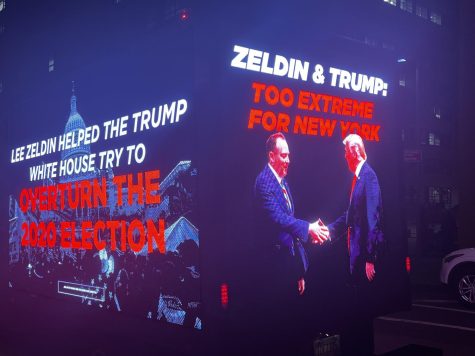
“I feel like [Zeldin] would be a Governor similar to Ron DeSantis in Florida or Greg Abbott in Texas, and we don’t need that here in New York,” Islam said. “It would be detrimental, not only to people who come to this State as a safe haven, [but for] LGBTQIA+ people, people of color and women who want safe access to abortion. That’s all on the line here in this election. If you don’t like [Hochul] as a person, think about what you’re actually doing if you elect someone as extreme as Lee Zeldin.”
Although he is not an NYS registered voter, Clay supports Hochul’s campaign, “Not because [he] think[s] she has been the best-running candidate, but it’s to mitigate the harm that Congressman Lee Zeldin would enact as the Governor of New York.”
Because education policy reform did not make it to the debate table, The Pace Press asked Zeldin to elaborate on his understanding to completely “end all indoctrination and brainwashing” referenced from his campaign website in relation to public schools. He used his 16-year-old daughters as examples, describing their experience with indoctrination when assigned to write an essay “on the side of the author,” based on Ta-Nehisi Coates, for his #1 New York Times Bestseller, “Between the World and Me.”
“In order to do the essay, you have to put yourself inside the head of the author,” he explained. While Zeldin first welcomed controversial debate with his opponent, he expressed the opposite sentiment for the classroom, stating that “What you shouldn’t be doing is having a setting in a classroom where these kids are getting along just fine, [and] are somehow pitted against each other, where they’re not being encouraged to take whatever position they want on some of this instructional material,” suggesting that writing essays in this nature pits students against one another.
Clay, Islam, Mangus and Jeremiah Williams, President of Pace Debates, are directly involved in the University’s political community and are urging students to vote.
“You’ll hear it again and again and it cannot be understated. Voting is where the power is, voting is where your voice is, voting is where change is,” added Williams.
“I don’t just mean on years when there’s a Governor’s race or Presidential election,” Mangus stressed. “I mean in city council vote, every single level you need to be voting at. Every single time there is an opportunity to vote, you should show up.”
Williams encourages students to “join political, debate or student government organizations [at their universities] to get more connected with politics and public affairs. The more well-informed and well-intentioned voters are engaged, the more that the outcomes we want can be achieved.”
Pace Debates and the Student Government Association (SGA) welcome student participation to help bridge the gap between local, national and international political conversations and the University student body. Pace Debates meets every Thursday in Room W515 in One Pace Plaza at 3:25 p.m., and SGA has an open forum for students to come and express concerns during their weekly meetings every Tuesday at 3:25 p.m. in Room W509.
Students can register to vote on the New York State Board of Elections website and find their local polling location. Early voting for the midterm elections opens Saturday, Oct. 29 with the official voting open on Tuesday, Nov. 8.

